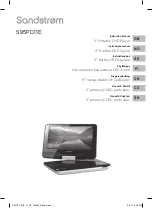
Page 1
60707-123
1315-00
GUIDE TO PRODUCT SAFETY
This engine generator set has been designed and
manufactured to allow safe, reliable performance. Poor
maintenance, improper or careless use can result in potential
deadly hazards; from electrical shock, exhaust gas
asphyxiation, or fire. Please read all safety instructions
carefully before installation or use. Keep these instructions
handy for future reference. Take special note and follow all
warnings on the unit labels and in the manuals.
ANSI SAFETY DEFINITIONS
______________________________________________________
DANGER
:
DANGER indicates an imminently hazardous situation
which, if not avoided, will result in death or serious injury.
This signal word is to be limited to the most extreme
situations.
______________________________________________________
______________________________________________________
WARNING
:
WARNING indicates a potentially hazardous situation
which, if not avoided, could result in death or serious injury.
______________________________________________________
______________________________________________________
CAUTION
:
CAUTION indicates a potentially hazardous situation
which, if not avoided, may result in minor or moderate injury.
It may also be used to alert against unsafe practices.
______________________________________________________
NOTE
:
CAUTION is also used on the unit labels and in this manual
to indicate a situation that could result in serious damage or
destruction of the equipment and possible personal injury.
______________________________________________________
1.
ELECTRIC SHOCK-
The output voltage present in this
equipment can cause a fatal electric shock. This equipment
must be operated by a responsible person.
a. Do not allow anyone to operate the generator without
proper instruction.
b. Guard against electric shock.
c. Avoid contact with live terminals or receptacles.
d. Use extreme care if operating this unit in rain or snow.
. e. Be sure the unit is properly grounded to an external
ground rod driven into the earth.
2.
FIRE HAZARD
- Gasoline and other fuels always present a
hazard of possible explosion and/or fire.
a. Do not refuel when the engine is running or hot. Allow
the engine to cool at least two minutes before refueling.
b. Keep fuel containers out of reach of children.
c. Do not smoke or use open flame near the generator
set or fuel tank.
d. Keep a fire extinguisher nearby and know its proper
use. Fire extinguishers rated ABC by NFPA are
appropriate.
e. Store fuel only in an approved container, and only in
a well-ventilated area.
3.
DEADLY EXHAUST GAS
- Exhaust fumes from any
gasoline engine contain carbon monoxide, an invisible,
odorless and deadly gas that must be mixed with fresh air.
a. Operate only in well ventilated areas.
b. Never operate indoors.
c. Never operate the unit in such a way as to allow
exhaust gases to seep back into closed rooms (i.e.
through windows, walls or floors).
4.
NOISE HAZARD
- Excessive noise is not only tiring, but
continual exposure can lead to loss of hearing.
a. Use hearing protection equipment when working
around this equipment for long periods of time.
b. Keep your neighbors in mind when permanently
installing this equipment.
5.
CLEANLINESS
- Keep the generator and surrounding
area clean.
a. Remove all grease, ice, snow or materials that
create slippery conditions around the unit.
b. Remove any rags or other material that could create
potential fire hazards.
c. Carefully wipe up any gas or oil spills before starting
the unit.
d. Never allow leaves or other flammable material to
build up around the engine exhaust area.
6.
SERVICING EQUIPMENT
- All service, including the
installation or replacement of service parts, should be
performed only by a qualified technician.
a. Use only factory approved repair parts.
b. Do not work on this equipment when fatigued.
c. Never remove the protective guards, cover, or
receptacle panels while the engine is running.
d. Use extreme caution when working on electrical
components. High output voltages from this
equipment can cause serious injury or death.
e. Always avoid hot mufflers, exhaust manifolds, and
engine parts. They all can cause severe burns
instantly.
f. Installing a home-standby generator is not a “do-it-
yourself” project. Consult a qualified, licensed
electrician or contractor. The installation must comply
with all national, state, and local codes.


































